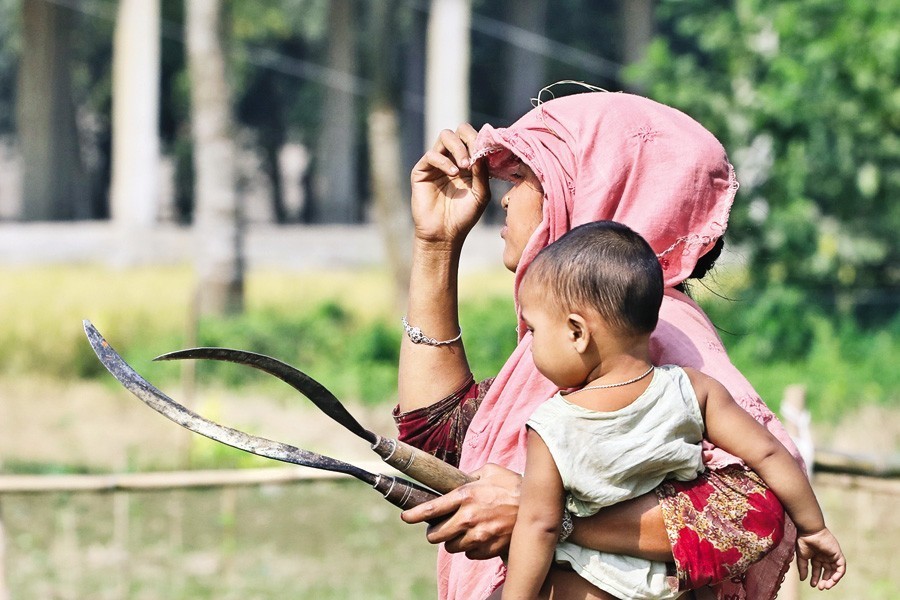Unlike many countries, Bangladesh has no reliable statistics on its workers in the informal sector. It sounds incredible due to the fact that the developing countries are mostly in need of it. The need is prompted by the reality that their governments and the donors find it an imperative while planning numerous labour-related projects and the foreign agencies' preparation of labour welfare programmes. Unfortunately, despite realising the utmost importance of the labour statistics, the successive governments remain habituated to skirting the issue --- which leads the international organisations to shift their normally wide focus from the workers. In the meantime, the ever-deprived informal working class suffers to be followed by the fall in the standard of a particular segment of work.
There have been a lot of uproars over protecting the informal workers. As has been seen in many critical sectors, it is the labour rights groups who come forward to uphold the case for the informal workers' sector. Intune with this, the labour rights groups say these workers are deprived of their fundamental rights including wages and workplace protections. Their demand that the informal workers, inclusive of those in the construction sector and their assistants, get sufficient protection by the existing labour law of the country is a timely one. The rights activists also take up the issue of the domestic workers. As they observe, the domestic workers are out ofthe purview of the labour law. At the same time, despite the construction workers being covered by the labour law, they do not enjoy rights such as the right to form trade unions. However, a few large platforms of the informal workers are clearly aware of their right to form trade unions. In fact, the labour sector of the country comprises mostly informal labour. Most of them are engaged in back-breaking work as farm hands, factory workers, porters outside unions at rail stations and launch terminals, drivers of privately owned cars etc, fishing community and workers at ghats. Moreover, there are brick field workers, housemaids, motor workshop mechanics and restaurant workers and many of their kind. Upon being limited to only the construction sector may amount to doing injustice to the others --- on the part of the rights groups. However, they try to be inclusive of all exploited workers.
Against this backdrop, the labour rights activists have lately made the demand at a workshop on the findings of the ILO-PRS/STRIDE pilot project: Promoting Decent Work and Women's Rights in the Backdrop of Covid-19. The Workers Resource Centre (WRC) organised the event in the capital. At the function, the WRC noted that although Bangladesh has ratified the ILO conventions 87 and C-98, due to many 'difficulties' in forming unions and collective bargaining issues, workers couldn't enjoy their rights properly. It's natural that the deprived workers have been focused on by the Bangladesh Bureau of Statistics (BBS). For the office is the store of all the data regarding the formal and informal workers. According to the Bureau, about 87 per cent of the total workforce is engaged in the informal economy. It's heartening, no doubt. But the data and its explanation also make one depressed. The BBS data says the number of workers employed in the construction sector is about 3.5 million. Among them 10 to15 per cent are women. They instil their hard labour in different types of jobs, otherwise meant for males, from dawn to dusk. The jobs are at the bottom level of manual livelihoods. They include breaking bricks into chips, crushing chunks of stones with hand-held heavy hammers and cutting large and small pieces out of soil etc.
Unfortunately, The loosely knit female labourers are unaware of their right to demand proper wages and wage structures. Apparently, most of them have never heard of the cases for solidarity among female workers or demanding rational work hours for them. Of the country's large informal workers engaged in physically unsuitable and hazardous jobs, it is the women and children who comprise the largest segment. Despite the rights activists' presence in every sector employing women informally, they seem to be bewildered by the sheer number of the manipulated lot.
Apart from the cases of the womenfolk shouldering the burden of physical labour like that done by their stronger male counterparts, the country's hapless female workforce is found in some other laborious works. In urban areas, a hefty size of women workforce can be found engaged in residences as maids. Unlike in the developed countries, even in some states in India, maid servants in the country are employed without any provision for work hours. Neither can they enjoy weekly holidays or days-long sick leave as they go with the formal jobs of guards, gardeners, drivers and other paid staff. In this country, being born a woman is like being tagged a person with little value in communities. They have to remain bound by the diktats framed by the male social guardians in cahoots with a section of unscrupulous women. Amazingly, Bangladesh has no reliable data on the female house help. Upon performing a guesswork, it can be estimated that approximately 10 million domestic workers are there in the country.
Apart from the adult women, the domestic help also include adolescent girls. Even children belong to this group. The topic of the domestic workers being left in the lurch invariably brings to the fore their physical and mental harassments. They lack even the feeble voice to protest against these injustices.


